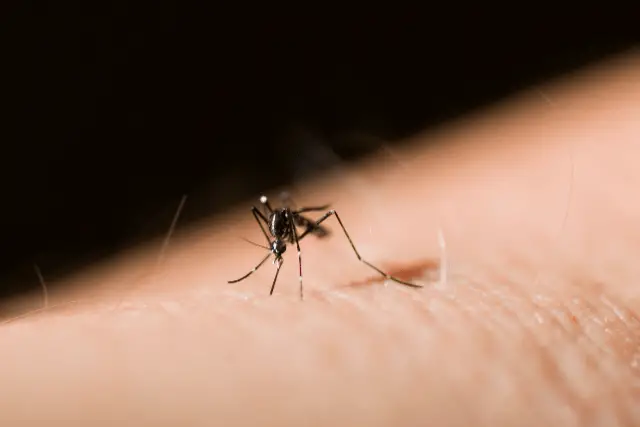Dogs & Mosquitoes - Can They Harm Your Dog?
28.08.2023.
As the weather warms up, mosquitoes emerge, ready to torment our beloved canine companions. Mosquitoes view dogs as just as much a target for biting as humans. When mosquitoes sink their piercing mouthparts into our dogs, it creates an annoying and itchy nuisance. But could mosquitoes also pose a more serious health threat to our four-legged friends?
This article will explore what attracts mosquitoes to dogs, the risks of mosquito bites, and how to protect your pup. We’ll also provide tips on soothing the irritating itch if your dog does get bitten. There are even some dangerous mosquito-borne diseases that dog owners should be aware of.
Do Mosquitoes Bite Dogs or Only People?
Mosquitoes will readily bite dogs just as they bite humans. Mosquitoes are attracted to both humans and dogs because of the carbon dioxide we exhale, our body heat, and smelly chemicals from our skin. Dogs and people also provide a blood meal that female mosquitoes need to develop their eggs. So, unfortunately, dogs are not immune to mosquito bites.

Can Mosquito Bites Harm Your Dog?
Mosquito bites are mostly just an itchy nuisance for dogs, similar to how they affect humans. However, there are some potential risks:
- Allergic reaction - Some dogs can have a severe allergic reaction to mosquito saliva. Signs include extensive redness, swelling, and hives at the bite site.
- Skin infection - Dogs that scratch mosquito bites vigorously can damage their skin and cause an infection.
- Disease transmission - Mosquitoes can transmit heartworm disease, West Nile virus, and other diseases to dogs. So, mosquito bites allow an entry point for these diseases.
So, while mosquito bites are not normally dangerous to dogs, it's still important to minimize your dog's exposure and risk.
Signs Your Dog Has a Mosquito Bite
How can you tell if your dog has mosquito bites? There are a few signs your dog could exhibit and they include:
- Small red bumps on the skin that look like welts or hives
- Scattered bites often on the face, ears, belly, feet, and other areas with thinner fur
- Intense itching, scratching, or licking at the bite sites
- Restlessness and discomfort
- Swelling, fluid-filled blisters or scabs from scratching

Your dog may also rub their face on furniture or the ground to self-soothe the itchy discomfort. If you notice these signs on your dog, examine their skin for mosquito bites. Dogs with light or thin fur will show bites more easily.
How to Keep Mosquitoes Away from Your Dog?
Here are some tips to protect dogs from mosquito bites:
- Use vet-approved insect repellents made specifically for dogs. Avoid human repellent, which can be toxic if licked.
- When outside at peak mosquito times (dawn, dusk, night), keep dogs on a leash to avoid running through infested areas.
- Ensure window and door screens are intact so mosquitoes don't get indoors.
- Remove standing water in the yard where mosquitoes breed.
- Use an EPA-registered mosquito control treatment for your yard.
- Put a mosquito-repelling collar on your dog.
- Keep dogs indoors at dawn and dusk when mosquitoes are most active.
- Use a fan near your dog’s bed to discourage mosquitoes from biting.
- Feed your dog inside rather than leaving food bowls outdoors.
With some diligence, you can significantly reduce your dog's mosquito exposure.
How to Treat Mosquito Bites on Dogs?
To ease your dog’s itchy discomfort from mosquito bites:
- Give an OTC oral antihistamine like Benadryl to reduce swelling, itching, and inflammation. Follow dosage guidelines.
- Apply a cold compress to bite areas to soothe itching and reduce swelling.
- Try a soothing oatmeal bath using colloidal oatmeal or oatmeal shampoo to ease itching.
- Apply baking soda paste or calamine lotion to bite sites.
- Give your dog ice cubes to lick, which provides cooling relief.
- Trim the fur around bite areas to reduce irritation from scratching.
- Apply an antibiotic ointment if bites become infected.

See your vet if reactions seem severe or don't improve. Steroid treatment may be needed for hive-like reactions.
Most mosquito bites can be managed at home with the above care. But contact your vet promptly about extensive reactions, signs of infection, or lethargy.
Diseases Spread by Mosquitoes
Some key diseases dogs can get from the bite of an infected mosquito include:
- Heartworms - Mosquitoes transmit heartworm larvae into the dog, which migrate to the pulmonary arteries and heart, leading to signs like cough, fatigue, and heart damage. Dogs should take preventives.
- West Nile Virus - Mosquitoes carry this virus that can cause fever, lethargy, vomiting, and neurological issues in dogs like limb weakness and seizures. Vaccines are available.
- Eastern Equine Encephalitis - This dangerous mosquito-borne virus attacks the brain and spinal cord, causing fever, paralysis, and seizures. It has a very high fatality rate in dogs. There is no cure, only supportive care.
For these reasons, protecting dogs from mosquitoes and giving heartworm prevention is crucial. Consult your vet about the risks in your area. With some diligence, you can help safeguard your dog's health against these harmful diseases spread by mosquitoes.
Can all dogs be bitten by a mosquito?
All dogs can get bitten by mosquitoes, regardless of breed, age, size, or fur type. However, some factors can make certain dogs more prone to mosquito bites:
- Dogs with thinner coats and exposed skin are more vulnerable (like Greyhounds, Whippets, Boxers, and Dalmatians). Mosquitoes can easily reach the skin surface to bite.
- Young puppies and senior dogs tend to get bitten more frequently. Puppies have thinner skin and limited mobility to escape mosquitoes. Older dogs have declining health, slower reflexes, and thinner hair coats.
- Mosquitoes target the ears, muzzle, belly, feet, and other areas with less fur covering.
- Mosquitoes are attracted to chemicals in dog sweat, oils, and smells. Active, anxious, or dirty dogs can be more attractive.
- Dogs confined in kennels or yards have limited escape from mosquitoes.
- Mosquitoes feed more aggressively at dawn and dusk when dogs are taken outside.
- Dogs in humid, wooded, and wet environments have heavy mosquito exposure.

While all dogs are susceptible, taking steps to protect thinner-coated breeds, puppies, seniors, and dogs in high-risk settings is especially important. But ultimately, all dogs can serve as a mosquito target and get bitten in the right circumstances. Using preventives and mosquito repellents can protect any dog from this irritating nuisance.
Conclusion
Mosquitoes find dogs just as appealing a blood meal source as humans. Mosquito bites can certainly trouble dogs with irritating itching and discomfort. But even more concerning, mosquitoes can transmit diseases like heartworm, West Nile virus, and encephalitis to dogs.
As a caring dog owner, you’ll want to understand the mosquito risks in your area. With some simple preventive measures, you can reduce your dog’s mosquito exposure and protect them from severe health impacts. If mosquito bites do occur, be prepared to ease your dog’s misery and itchiness.
A few easy treatment tips can provide relief, but contact your vet if reactions seem severe. By safeguarding your furry companion, you can both more comfortably enjoy the outdoors together without the menace of mosquitoes.
World Dog Finder team







Share